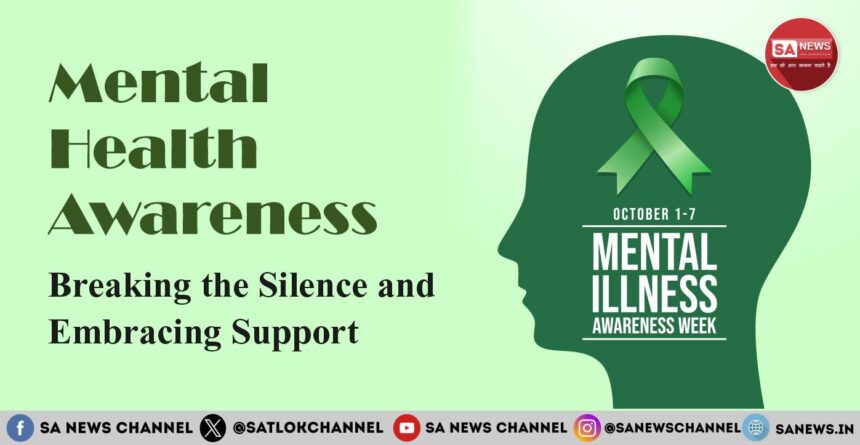Mental Health is a fundamental component of our overall well-being, shaping how we think, feel, and engage with the world around us. Despite its significance, mental health often remains obscured by stigma and silence. Mental Health Awareness is a pivotal opportunity to prioritize emotional well-being, confront the stigma associated with mental illness, and promote understanding and support.
- The Importance of Mental Health
- Stigma surrounding mental illness
- Seeking Help and Support
- Embracing Self-Care
- Creating a Supportive Community
- Mental Health in the Workplace
- Mental Health in Education
- Mental Health and Social Media
- Mental Health and Relationships
- What is the aim of creating mental health awareness?
- Spiritual Insights for Mental Wellness
- FAQs on Mental Health Awareness
- Q1: What is mental health awareness?
- Q2: Why is mental health awareness important?
- Q3: What are common mental health issues?
- Q4: How can I support someone with mental health issues?
- Connect With Us on the Following Social Media Platforms
Mental health awareness is crucial for fostering a supportive environment where individuals feel empowered to seek help and share their struggles. It involves educating people about mental health conditions, reducing misconceptions, and promoting understanding and empathy. Awareness initiatives often focus on recognizing the signs of mental health issues, such as anxiety, depression, and stress, and knowing where to find help. By spreading knowledge, we can encourage open conversations, which can lead to earlier intervention and better outcomes.
Schools, workplaces, and communities play a significant role in mental health awareness, creating spaces that prioritize well-being and support those who may be struggling. Effective mental health awareness also involves advocating for mental health services and policies that ensure access to care and support. It is essential for creating a culture where mental health is valued equally with physical health, leading to improved overall quality of life. Promoting mental health awareness not only helps individuals but also strengthens communities by fostering understanding and compassion.
The Importance of Mental Health
Mental health influences every aspect of our lives, from our relationships and work performance to our physical health and overall quality of life. It’s important to acknowledge that mental health exists on a spectrum, and everyone experiences challenges at times.
Ignoring or neglecting our mental health can lead to serious consequences, including:
- Anxiety and depression
- Suicidal thoughts and behaviors
- Substance abuse and addiction
- Chronic stress and burnout
- Strained relationships and social isolation
Stigma surrounding mental illness
This often prevents people from seeking the help they need. This stigma can manifest in various ways, such as:
- Fear of judgment or rejection
- Shame and guilt
- Lack of understanding or education
- Cultural or societal norms that discourage open discussion
Mental Health: Creating an environment where people feel comfortable discussing their mental health without fear of judgment is essential. By sharing our experiences and supporting those around us, we can break down the barriers that hinder open conversations.
■ Also Read: Healthy Heart Tips: Your Heart: A Symphony of Health – A Comprehensive Guide to a Strong and Vibrant Life
Seeking Help and Support
If you or someone you know is struggling with mental health, remember that help is available. Consider reaching out to, Mental health professionals (therapists, counselors, psychologists), Support groups (in-person or online), (e.g., National Suicide Prevention Lifeline: Call or text the 988 Suicide & Crisis Lifeline).
Online resources (https://www.nimh.nih.gov/health/topics/suicide-prevention).
Embracing Self-Care
Prioritizing self-care is vital to maintaining mental health. Consider:
- Practicing mindfulness and self-compassion
- Engaging in activities that bring joy and relaxation
- Building strong relationships and social connections
- Taking breaks and setting boundaries
- Ensuring adequate sleep and exercise
Creating a Supportive Community
Everyone has a role to play in creating a supportive community:
- Listening without judgment
- Offering resources and support
- Encouraging open conversation
- Challenging stigma and stereotypes
- Promoting mental health education and awareness
- Remember, mental health matters and let’s start the conversation and break the silence.
Mental Health in the Workplace
Mental Health: Workplace environments significantly impact mental health. Employers can promote mental health awareness by:
- Providing access to mental health resources and support
- Encouraging open conversations and reducing stigma,
- Offering flexible work arrangements and stress management techniques
- Promoting work-life balance
Mental Health in Education
Mental health in education is essential for students of all ages. Schools can foster mental health awareness by:
- Incorporating mental health into the curriculum
- Providing access to mental health resources and support
- Encouraging open dialogue and reducing problems
- Promoting positive relationships and social connections
Mental Health and Social Media
Mental Health: Social media can influence mental health in both positive and negative ways. It’s important to:
- Use social media responsibly and mindfully
- Take breaks and practice self-care
- Follow accounts that promote positivity and support
- Be aware of online resources and support
Mental Health and Relationships
Mental Health: Healthy relationships have a profound impact on mental health. To nurture these connections:
- Prioritize relationships and invest time in them
- Practice effective communication and conflict resolution
- Set boundaries and prioritize self-care
- Seek support from loved ones when needed
Actually, Mental health awareness is an ongoing journey for everyone that requires effort and dedication from individuals, communities, and society as a whole. By working together to promote support, we can create a world where mental health is valued and nurtured.
What is the aim of creating mental health awareness?
It aims to promote open conversations, and increase access to resources and support. By raising awareness, we help create an environment where mental health is valued, and those struggling with mental health issues feel empowered to seek help without fear of judgment. Education and empathy are key in fostering a supportive community that prioritizes mental health and ensures that everyone has the opportunity to live a fulfilling life.
Spiritual Insights for Mental Wellness
Mental Health: The only true Saint available on earth who cares for each individual present on this earth is Sant Rampal Ji Maharaj ji who teaches that true mental peace comes from spiritual enlightenment and following the path of righteousness. According to His teachings, mental disturbances often arise from ignorance of our true purpose of life, attachment to materialistic desires, and the neglecting of our spiritual duties. He emphasizes that by understanding and following the divine knowledge shared by the True Spiritual Leader, one can attain a state of inner peace and mental stability.
Sant Rampal Ji Maharaj ji emphasizes that by practicing Naam Simran (meditation on the Divine Naam) and attending Satsang (spiritual discourses), one can achieve inner peace and mental stability. Sant Rampal Ji Maharaj also addresses the stigma surrounding mental illness, encouraging compassion and understanding. He advocates for a balanced lifestyle that nurtures the soul through mindful living and spiritual discipline. By creating supportive spiritual communities, we can help others find peace and break the barriers that prevent open conversations about mental health.
In essence, His teachings provide a spiritual approach to mental well-being, integrating spiritual wisdom with practical self-care. By following His guidance, individuals can overcome mental challenges and find true peace within themselves, contributing to a world where mental health is valued and nurtured.
FAQs on Mental Health Awareness
Q1: What is mental health awareness?
Mental health awareness involves understanding and recognizing mental health issues, reducing stigma, and promoting support for those affected.
Q2: Why is mental health awareness important?
Mental health awareness is vital for early intervention, treatment, and support. It helps reduce stigma, encourages open conversations, and promotes overall well-being.
Q3: What are common mental health issues?
Common mental health issues include anxiety, depression, bipolar disorder, post-traumatic stress disorder (PTSD), and substance abuse.
Q4: How can I support someone with mental health issues?
You can support someone with mental health issues by:
Listening without judgment
Encouraging open conversation
Offering resources and support
Respecting boundaries









